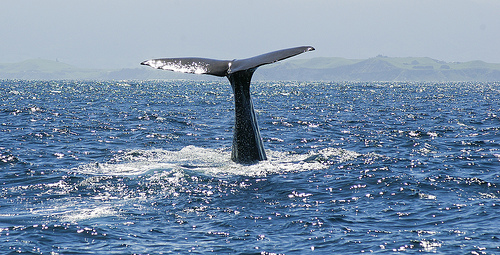From the Community: genetically altered salmon, microbes on dogs’ paws and anchovy roulette
 Genetically altered animals come closer to approval, global climate change extends the time space junk orbits the Earth, researchers develop a method to identify and analyze whale vocalizations, artists shape messages about the planet’s health and female mollies prefer a more mustachioed mate. Here are highlights in ecology from the last week in June.
Genetically altered animals come closer to approval, global climate change extends the time space junk orbits the Earth, researchers develop a method to identify and analyze whale vocalizations, artists shape messages about the planet’s health and female mollies prefer a more mustachioed mate. Here are highlights in ecology from the last week in June.
Genetically altered salmon: Genetically modified salmon—Atlantic salmon containing a growth hormone from Chinook salmon and a genetic “on-switch” from the pout—is being officially reviewed by the Food and Drug Administration. If the double-sized salmon is approved for the market, it could clear the path for other modified animals. According to The New York Times, “next in line behind the salmon for possible approval would probably be the ‘enviropig,’ developed at a Canadian university, which has less phosphorus pollution in its manure.” Read more at “Genetically Altered Salmon Get Closer to the Table.”
Dogs and microbes: Microbes appear to be responsible for a faint popcorn or corn chip smell associated with some dogs’ paws, said a writer on the Mental Floss blog. Matt Soniak explains that the presence of yeast or the bacterium Proteus, which are both known for their sweet, corn tortilla smell, or the bacterium Pseudomonas could be living and breeding in the folds of the paws and causing an odor. Read more at “Why Do Your Dog’s Feet Smell Like Popcorn?”
Space junk: Scientists have added space junk—debris like broken satellites or parts from a rocket in the Earth’s orbit—to the list of concerns associated with global climate change. Researchers from the University of Southampton in the U.K. found that the atmosphere is reducing in density by 5% every decade at an altitude of 300 kilometers, causing the debris to stay in orbit longer. Read more at “Climate change is leaving us with extra space junk.”
Sperm whale communication: Biologists have developed a new technique for deciphering the calls of sperm whales, leading to new discoveries about their vocalization and communication. As the researchers described in the journal Marine Mammal Science, subtle variations in the sperm whale vocalizations, caused by differences in the shape of individual whales’ heads, were linked to specific individuals. Read more at “Sperm Whale Voices Are Personal.”
Anchovy roulette: Artists are showcasing microbes, locusts’ shells and anchovies in an exhibit at the Museum of Arts and Design in New York. In a New Scientist gallery, six of the artists explain their statements about the health of the planet. In the installment Roulette, Tracy Henenberger explains the wheel of bamboo and anchovies: “I called the piece Roulette because I feel that humans are gambling with their future, and that of the planet, for short-term gain.” Read more at “Artistic agenda: The state of eco-art.”
Also, a photo essay of the Gulf of Mexico and the oil leak, the White House halts BP funding for research, documenting an expedition to study the Humboldt squid, tool-using vultures, the male mustachioed molly of Mexico and jet propulsion versus undulation in marine life.
Photo credit: doublebug